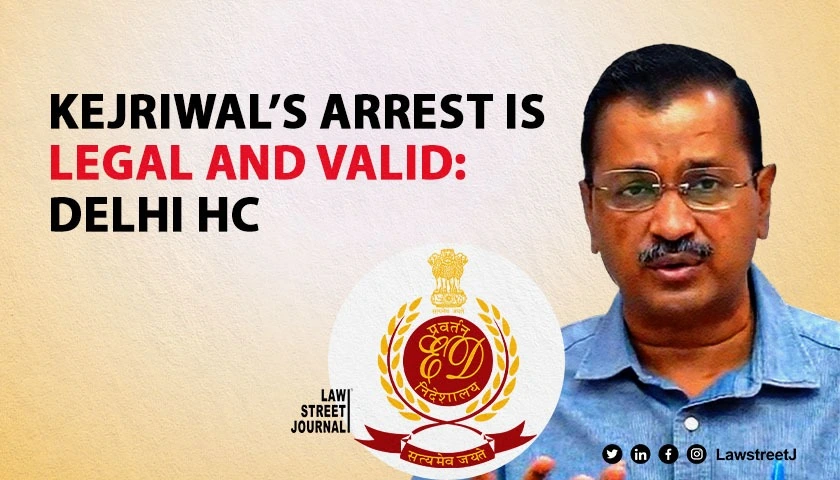NEW DELHI: In a setback for Delhi Chief Minister Arvind Kejriwal, the Delhi High Court on Tuesday dismissed his plea challenging his March 21 arrest by the Enforcement Directorate in the liquor policy scam case, after finding that his "arrest was legal" and no different law can be applied for him.
Also Read - Arvind Kejriwal's plea for interim release rejected by Delhi High Court [Read Order]
Kejriwal would continue to remain in Tihar jail till he gets any relief from the Supreme Court.
Pronouncing the order on his writ petition, Justice Swarana Kanta Sharma said, "The arrest of Arvind Kejriwal was not in contravention of the legal provisions. The remand can't be held to be illegal."
Besides his arrest, Kejriwal also challenged his remand by the Special Court.
"The material collected by the ED reveals that Kejriwal conspired and was involved in formulation of excise policy and used proceeds of crime. He is also allegedly involved in personal capacity in formulation of policy and demanding kickbacks and secondly in the capacity of national convenor of AAP," the court said.
In its order, the court said, the rigours of section 70 PMLA are attracted in this case.
Notably, Section 70 penalises offences by companies. When a company contravenes the PMLA, every person who at the time the contravention was in charge of conduct of business of the company will be deemed to be guilty, the court said in its order.
Kejriwal is likely to challenge the HC order.
Also Read - Court sends Kejriwal to ED's further custody remand till April 1 [Read Order]
Additional Solicitor General S V Raju, who argued for the ED, said the judgment has done justice in the case.
The court had reserved its order on April 3 as the ED claimed Kejriwal was the kingpin and the main conspirator of the scam.
Kejriwal claimed he was arrested right after the Model Code of Conduct (MCC) was imposed, in order to humiliate, insult, and disable him and his political party.
Kejriwal is currently in judicial custody. He was arrested on the night of March 21. On March 22, a trial court remanded him to six days of ED custody, which was extended by further four days. On April 01, he was remanded to judicial custody till April 15.
In its judgement, the High Court relied upon statements of approved and held there were enough materials in the case indicating towards role of Kejriwal.
The court said approvers' statements were recorded by the Court and not by the probe agency.
"To cast aspersion on the manner of recording statements of approver would amount to casting aspersions on the judicial process. The law of approver is more than 100 years old. It is not a one year old law to suggest as if it was enacted to falsely implicate the petitioner," the bench said, rejecting Kejriwal's contention witnesses/approvers were pressurised to name him.
Also Read - Delhi liquor scam: Court remands Arvind Kejriwal to ED custody till March 28 [Read Order]







![Delhi High Court Sets Aside Arbitral Tribunal's Award Against NHAI in Highway Project Delay Case [Read Judgment]](/secure/uploads/2023/07/lj_9605_23374c2e-392c-4491-a2fe-f2f12fc5272f.jpg)
![Delhi Court Rejects Stay Request in Defamation Case Against Rajasthan CM Ashok Gehlot [Read Order]](/secure/uploads/2023/08/lj_5208_80de1ddc-d76a-4f7f-b180-408e3ae14fb4.jpg)





